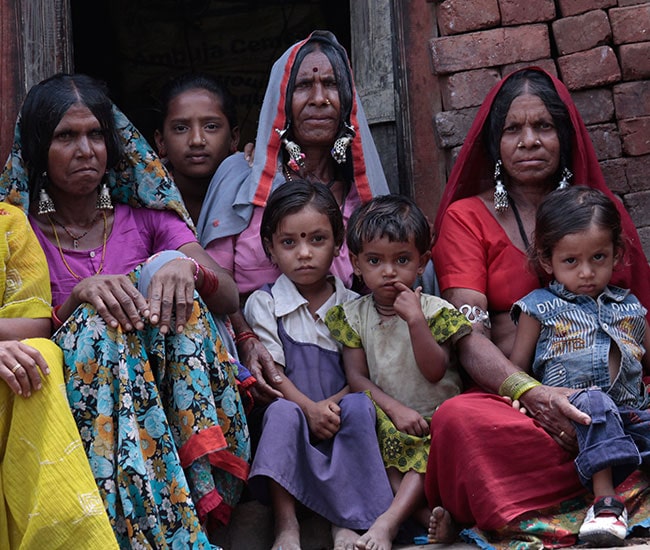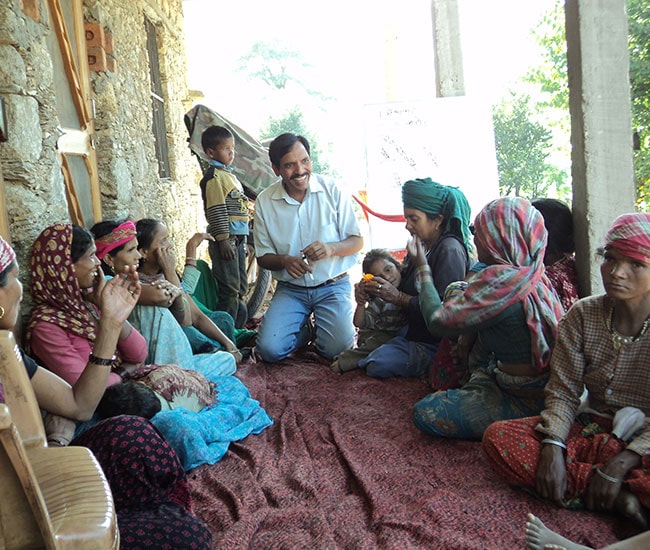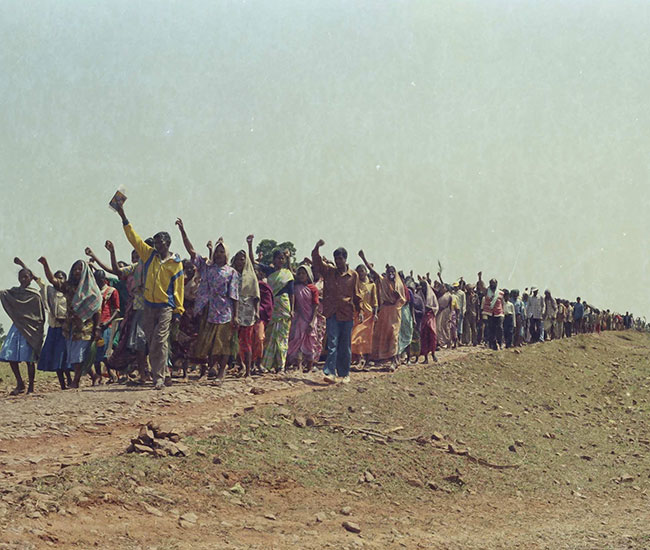
Adivasi Kranti Sangathan
Dhenkanal and its adjoining districts were under feudal rule before independence. This region is rich in its forest and mineral resources. The tribals being forest dwellers settled in these forests after migrating from Singhbhum and Santhal Parganas in search of habitation. The kings during those times settled the tribals to protect the forests from fire and smugglers. Those settlements were then declared as forest villages by the king.
Adivasi Kranti Sangathan, a people’s organisation, since 1996, has been organizing the tribals to emerge as a collective force for securing their dignity and self-respect. At its inception the sangathan started with only one panchayat, Maruabili panchayat. Confrontation with timber, chromite and liquor mafia was almost an everyday issue. The non-tribals were the main exploiters and suppressed the tribals. The tribals had no basic amenities till then. They didn’t have BPL cards, so were excluded from the public distribution system. The sangathan spent almost two years in bringing awareness amongst the people. Gradually when some of the local youths volunteered for the sangathan, the mobilization process gained momentum. Presently, it has got a strong base in more than 100 villages from one of the remotest corners of the Dhenkanal district.
Forest Protection
Abundant forest resources, water resources and mineral resources in this region have led to its exploitation. It has attracted many industries, mining companies and timber smugglers as well. Timber smuggling by the mafia was an everyday issue in the area till the Sangathan intervened. Mobilizing the local villagers, the sangathan successfully stopped the illegal felling of timber by smugglers who enjoyed political patronage. The local smugglers belonged to non-tribal groups who supplied timber at cheap rates to outsiders such as businessmen from Jajpur and private saw mills. The villagers thereafter have been keeping a close watch on the timber mafia to protect the forests. They have been regenerating forests around their villages since it is their major source of livelihood.
A recent incident shocked the villagers when they found that the State Forest Department and the Orissa Forest Development Corporation (OFDC) have cut down some 700 healthy and immature trees in the reserve forest in the name of executing working plans of the forest division. The villagers and the karyakartas of the Sangathan then ascertained that the felling of the trees was against the guidelines prescribed in the existing working plan of the Dhenkanal Forest division. When the villagers protested against the illegal tree felling, the forest officials threatened to evict them. A memorandum was sent to the Governor of Orissa by the villagers with the help of the sangathan. A press meet was organised at the District Headquarters where correspondents from all the local newspapers and electronic media were present. Pany and his sangathan have consulted a Supreme Court lawyer to intervene at the Central Empowered Committee (CEC) level.
Food Security
Apart from the basic struggle on the issues of livelihood, the team was successful in pressurising the government to resurvey the Below Poverty Line (BPL) beneficiaries. They found that the BPL (Below Poverty Line) list was faulty and majority of the real beneficiaries were not included and hence not eligible under the PDS scheme. Through people’s pressure, a district level resurvey was ordered and later through the support of an MLA, a resurvey of the entire BPL list of the Orissa state was ordered. As a continuous struggle, the sangathan has been able to ensure Antyodaya and Annapurna cards to more than 2000 families.
Panchayati Raj
The sangathan has been making conscious efforts in exercising people’s socio-political rights in the Gram-Sabha and Palli-Sabha. The sangathan has actively participated in the panchayat elections, fielding their own candidates, many of who won. This was done to take control over development funds and implement development schemes effectively. The tribal community has never participated in panchayat elections until the 74th Amendment was passed. The sangathan played a major role in ensuring that the tribals were represented during elections and asserted their participation in gram sabhas. At present, there are 4 active karyakartas who have been elected as sarpanchs. One of the main karyakartas, Pratap Marandi, who is a tribal is the President of the Sarpanch Sangh. He is also a member of the District Public Distribution System and Child Labour Abolition Committee. Two other karyakartas are in the District Vigilance and Monitoring Committee.
Preserving the ethnic diversity and reviving tribal culture is high on the sangathan’s agenda. The sangathan has been taking a proactive role in preserving the tribal culture in the area. They organized different programs in the area to promote tribal traditional dance forms, songs and theatre. It is through the Sangathan’s effort that Olchiki, the script of the Santhal tribes and Warantiki, the script of Munda tribes has been promoted through the establishment of schools in these areas. Adivasi Kranti Sangathan has taken the initiative by establishing Olchiki schools affiliated to the Board of Santhal Education, Govt. of Orissa, in 9 tribal villages of the Dhenkanal district in Orissa.
NREGA
A.K.Pany, is a member of the governing body of DRDA Dhenkanal. A General Body meeting was organised at the District level for planning possible projects under NREGA. While others prioritized on infrastructure building, communication facilities and animal husbandry, etc. the sangathan suggested agriculture based works and small irrigations which may be useful in providing sustainable subsistence to poor tribals and small farmers. This recommendation was highly appreciated and was included in the plan.
Land Issue
Lands of the project affected families of Dandadhar water reservoir were regularized after regular intervention of the sangathan. 414 families were displaced during this project, out of which 365 families got their house site patta. Many tribal families did not have record of rights and house site patta. With the sangathan’s effort along with the villagers, more than 2000 families were able to get the house site patta. Their agricultural land also got regularized.
The sangathan mobilized the PRI institutions to defend the proposed amendment of the Orissa Scheduled Areas Transfer of Immovable Property Regulation Act, 1956. Memorandums along with resolutions of 18 gram palli sabha of Kankadahad block were sent to the Governor of Orissa protesting the decision of the government and the Tribal Advisory Council. The sangathan has been quite actively participating in the forest campaign with National Campaign for Survival and Dignity both at the state and the central level.
Stories
Campaign against liquor mafia
To earn large scale of revenue, liquor businessmen from Chhattisgarh were provided with licenses to open and run liquor shops in the Kamakhyanagar subdivision of Dhenkanal district. The intention of these liquor mafias was to monopolise the liquor business and forcibly shut the sale of handia (rice-beer) prepared by the tribals. They also forcibly collected mahua flowers from the tribals and the dalit women at a very low price. The women were the main victims. The local police and the administration posed a deaf ear to the complaints of the villagers. A massive campaign was organised by the sangathan with the support of other sangathans and the Bar Association. Many self-help groups of the subdivision irrespective of caste and class joined the campaign demanding the cancellation of the license and a complete ban on the policy decision of the Government of Orissa for the commercialization of mahua liquor. More than 10,000 people joined in the rally. A public meeting was conducted in front of the sub collector’s office and the road was blocked for five hours. Memorandums were sent to the Chief Minister and Governor of Orissa as well as the District Collector. Village level camps were organised to explain the wrong policy of the government just to enhance the revenue collection. The issue was discussed in the Orissa State Legislative Assembly but the ruling party however didn’t give a satisfying response to this issue.
Health
The sangathan had applied to the District Collector for opening 50 anganwadi centres as per the new guideline that there should be one anganwadi center per 40 tribal children of the age-group 0-6 years. 30 Anganwaadi centres have been set up in Kankadahad block with continuous monitoring from the sangathan. The effort is on to appoint anganwadi workers from the tribal community.
Village Health Guides have also been appointed in every tribal hamlet and medicines for common diseases have been distributed free of cost.



